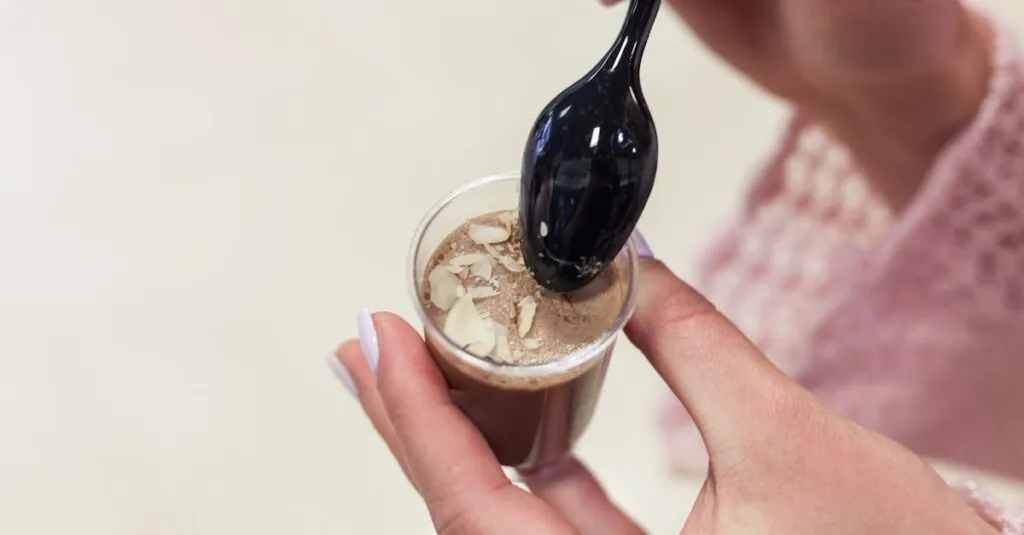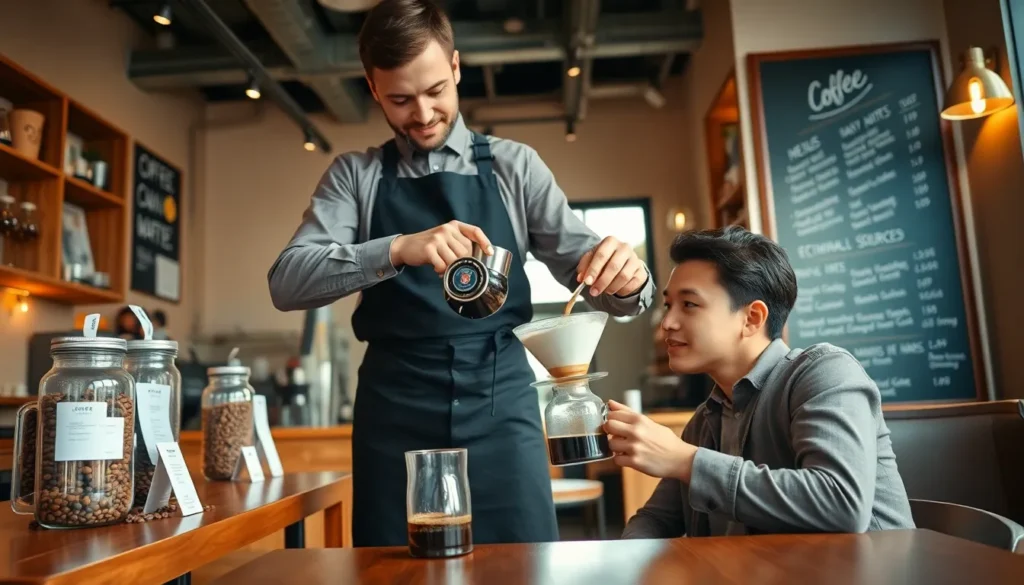Table of Contents
ToggleImagine walking into a room filled with the rich aroma of freshly brewed coffee, where passionate enthusiasts gather to sip, swirl, and savor every drop. Coffee tasting events are where the magic happens, transforming ordinary coffee lovers into connoisseurs. It’s not just about caffeine; it’s a delightful journey through flavors and aromas that can make even the most serious coffee drinker giggle with joy.
Whether you’re a casual sipper or a self-proclaimed coffee snob, these events offer a unique opportunity to explore the world of coffee like never before. From fruity notes to chocolatey undertones, each cup tells a story waiting to be discovered. So grab your favorite mug and prepare to dive into a world where every sip is an adventure and every laugh is fueled by a little caffeine magic.
Overview of Coffee Tasting Events
Coffee tasting events immerse participants in a world of flavors and aromas. These gatherings attract both casual drinkers and dedicated enthusiasts seeking to deepen their appreciation of coffee. At these events, attendees sample various coffee types, each with unique characteristics.
Participants often explore single-origin coffees, blends, and different brewing methods. Flavor profiles may highlight fruity, nutty, or chocolaty notes. Each tasting emphasizes the importance of aroma in identifying quality aspects, allowing for a richer sensory experience. Many events offer guided tastings, led by knowledgeable baristas or coffee professionals who discuss the coffee’s origin, cultivation, and processing.
Engagement in coffee tasting evolves into a community experience, as participants share their impressions and preferences. Personal interactions enhance the enjoyment of discovering new flavors together. Some events even incorporate local pastries or chocolate pairings, enriching the tasting experience.
Crafting coffee tasting events involves attention to detail. Organizers carefully select coffees to showcase diverse profiles. Typically, each event includes educational sessions about brewing techniques and coffee handling, aiming to elevate participants’ knowledge. Engaging participants through questions fosters an open dialogue, promoting a deeper understanding of individual tastes.
This exciting culinary journey not only educates but also encourages experimentation. Enthusiasts often leave these events inspired to try brewing methods at home. Overall, coffee tasting events serve as a platform for connection, exploration, and enjoyment in the world of coffee.
Types of Coffee Tasting Events
Various types of coffee tasting events cater to different preferences and experiences. Participants find enjoyment in exploring diverse coffees through both public and private settings.
Public Tasting Sessions
Public tasting sessions welcome coffee lovers from all backgrounds. These events often feature multiple brewing methods and various coffee types. Attendees engage in guided tastings led by skilled baristas, who explain each coffee’s unique characteristics. Flavor profiles, including fruity and nutty notes, become more pronounced during these group experiences. Networking occurs naturally, as participants share thoughts and discoveries with fellow coffee enthusiasts. Local pastries or chocolates frequently complement these sessions, enhancing the overall tasting experience.
Private Tastings
Private tastings offer a more intimate setting tailored to specific preferences. These events typically involve small groups of friends or colleagues. Participants enjoy personalized experiences led by expert baristas. Each session may focus on a specific theme, such as single-origin coffees or regional blends. Educational discussions on brewing techniques often accompany the tastings, deepening understanding of coffee. Customized pairings with gourmet treats may also enhance flavors and create memorable moments. Exclusive settings foster deeper connections among attendees as they explore the complexities of coffee together.
What to Expect at Coffee Tasting Events
Coffee tasting events offer a sensory exploration of flavors, aromas, and coffee-making techniques. Participants engage in an immersive experience, enhancing their appreciation of this beloved beverage.
Tasting Process
The tasting process involves several distinct steps designed to highlight various characteristics of coffee. First, attendees smell the coffee to identify aromatic notes. Next, tasting occurs where participants sip and savor the flavors, allowing the coffee to coat the palate. Comparison between different brews showcases diverse profiles. Baristas typically guide discussions, providing context on brewing methods and origins. Engaging with others facilitates sharing personal impressions and preferences, enriching the overall experience. This hands-on approach fosters a deeper understanding of flavor nuances.
Coffee Varieties and Profiles
Coffee varieties and profiles play a crucial role in tasting events. Single-origin coffees highlight specific regions, often exhibiting unique traits associated with their growing conditions. Common profiles include fruity, floral, nutty, and chocolaty flavors. Blends combine beans from different origins, creating complex flavor dimensions. Participants discover how processing methods, such as washed or natural, influence taste. Attendees often sample coffees prepared using various brewing techniques, enhancing their exploration of flavor intensity and body. By examining these variables, participants gain broader insights into the diverse world of coffee.
Benefits of Attending Coffee Tasting Events
Attending coffee tasting events provides several benefits, enhancing both knowledge and appreciation of coffee. Participants expand their palate through sampling a range of coffees. They experience unique flavor developments, such as fruity, nutty, and chocolaty notes, broadening their understanding of coffee varieties.
Networking opportunities abound in these events. Coffee lovers share impressions and preferences, building connections with others who share similar interests. Engaging with passionate baristas adds depth to the experience, as they guide participants through the nuances of each brew.
Educational components play a vital role. Sessions often include discussions on brewing techniques and coffee origins. They equip attendees with practical skills for experimentation at home, encouraging confidence in personal brewing methods.
Sampling single-origin coffees versus blends offers additional insights. Single-origin selections highlight specific regional traits, while blends reveal complexity through diverse flavor dimensions. Understanding these differences contributes to a more nuanced appreciation of coffee.
At these events, tasting processes foster sensory awareness. Each step, from smelling to sipping, heightens the overall experience. Participants learn to identify key aromatic notes, creating a richer coffee journey.
Pairing local pastries or chocolate enhances the tasting experience. Complementing coffee with food elevates flavors and encourages exploration of different combinations. This culinary aspect deepens enjoyment, making for a memorable outing.
Embracing the community atmosphere adds to the overall enjoyment. The shared experience of discovering new flavors fosters camaraderie among attendees. Coffee tasting events transform into lively gatherings, creating lasting memories filled with laughter and shared discoveries.
Tips for Participating in Coffee Tasting Events
Choosing the right attire enhances comfort during coffee tasting events. Since participants often move between different coffee stations, dressing in layers allows for adaptability to various settings.
Focusing on the tasting process helps clarify flavor profiles. Taking time to smell and sip coffee individually reveals unique aromas and tastes. Comparing multiple brews side by side fosters deeper understanding and appreciation.
Engaging with baristas enriches the experience. Asking questions about coffee origins, brewing methods, and flavor notes leads to valuable insights. Sharing personal impressions adds to the communal atmosphere, fostering connections with fellow coffee enthusiasts.
Taking notes during the event proves beneficial. Documenting observations aids in recalling flavors and preferences later. Review of notes can spark interest in trying new varieties at home.
Sampling complementary snacks elevates the tasting experience. Pairing local pastries or chocolates with coffee enhances overall flavor profiles. Exploring different pairings encourages creativity in future coffee enjoyment.
Participating in discussions cultivates a sense of community. Listening to others’ impressions offers diverse perspectives on flavor profiles. Engaging in dialogue about favorites builds connections among attendees.
Embracing the educational aspects of the event broadens knowledge. Attending workshops on brewing techniques or coffee history enriches appreciation. Investing time in learning about coffee cultivation can elevate one’s overall understanding.
Arriving early allows for a relaxed start. Early arrival provides the opportunity to settle in and choose prime tasting spots. Being present from the beginning sets the stage for a more engaging experience.
Coffee tasting events offer a unique opportunity to dive deep into the world of coffee. They transform casual drinkers into informed enthusiasts who appreciate the nuances of flavor and aroma. The communal aspect fosters connections among participants while enhancing their understanding of coffee’s rich history and diverse profiles.
Whether attending a public gathering or a private session, each event provides a chance to explore various brews and engage with knowledgeable baristas. The experience is not just about tasting; it’s about sharing stories and discovering new favorites. By participating in these events, coffee lovers can elevate their appreciation and inspire their own brewing adventures at home. Each cup tells a story waiting to be uncovered.




